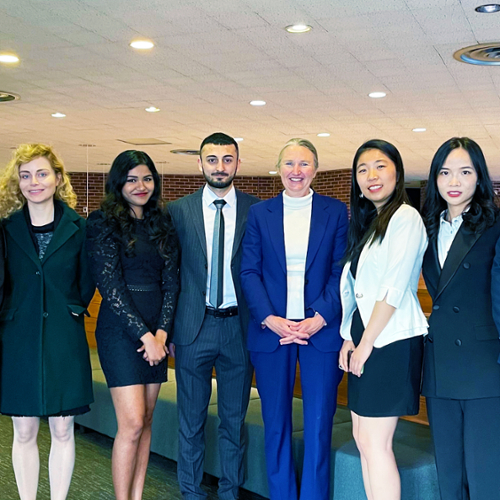For millions of people around the world, the onset of the COVID-19 pandemic brought with it a realization that everything was about to change.
For three Brandeis International Business School alumni and the critical intergovernmental organizations they work for, that moment of reckoning was coupled with the urgent need to draw up blueprints for a global economic recovery.
Andrea Dore, MA’98, is the head of funding in the capital markets and investments department of the World Bank. Elida Reci, MA’99 is an economist working for the department for social and economic affairs at the United Nations (UN). And Olaf Unteroberdoerster, MS’98, PhD’98, is a division chief in the finance department of the International Monetary Fund (IMF).
During a
Trends in Asset Management panel on March 24, Dore, Reci and Unteroberdoerster described how their organizations quickly adapted existing tools and launched new programs to meet the unprecedented challenges posed by the coronavirus.
“Within hours we focused on fighting the pandemic,” said Unteroberdoerster. “And it was really impressive to see how quickly we then shifted gears at all levels.”
Unteroberdoerster said the IMF augmented an existing emergency finance program and streamlined the approval process, sending more than $110 billion to 85 countries in 2020. Prior to the pandemic, only three or four countries used the program, he said.
“The IMF is essentially a firefighting institution at the center of the global financial safety net,” said Unteroberdoerster. “The IMF was designed to address economic and financial crises, and while this is a health crisis in the first instance, it is also an economic and financial crisis.”
Over the span of eight days in April 2020, Dore said the World Bank raised $15 billion from global capital markets to fund COVID-relief programs for a range of countries. All told last year, the World Bank raised $80 billion — double the typical amount, she said.
“Recognizing the magnitude of the crisis, we had to set things up fairly quickly,” said Dore. “There is no sort of training book or any training manual for this.”
Reci said the UN responded in myriad ways at the global and national levels, targeting health, education and critical infrastructure support.
“We’re trying at the same time to work on reducing our vulnerability to future pandemics,” said Reci. “And that comes by strengthening our institutions and their capacities to respond to such crises.”
Trends in Asset Management is a virtual event series featuring insights from top finance executives and academics. The March 24 panel, titled “Innovative Financing for the COVID-19 Recovery: The View from the IMF, UN and World Bank,” was co-sponsored by the International Business School’s Asset Management Council and the
Perlmutter Institute for Global Business Leadership.



